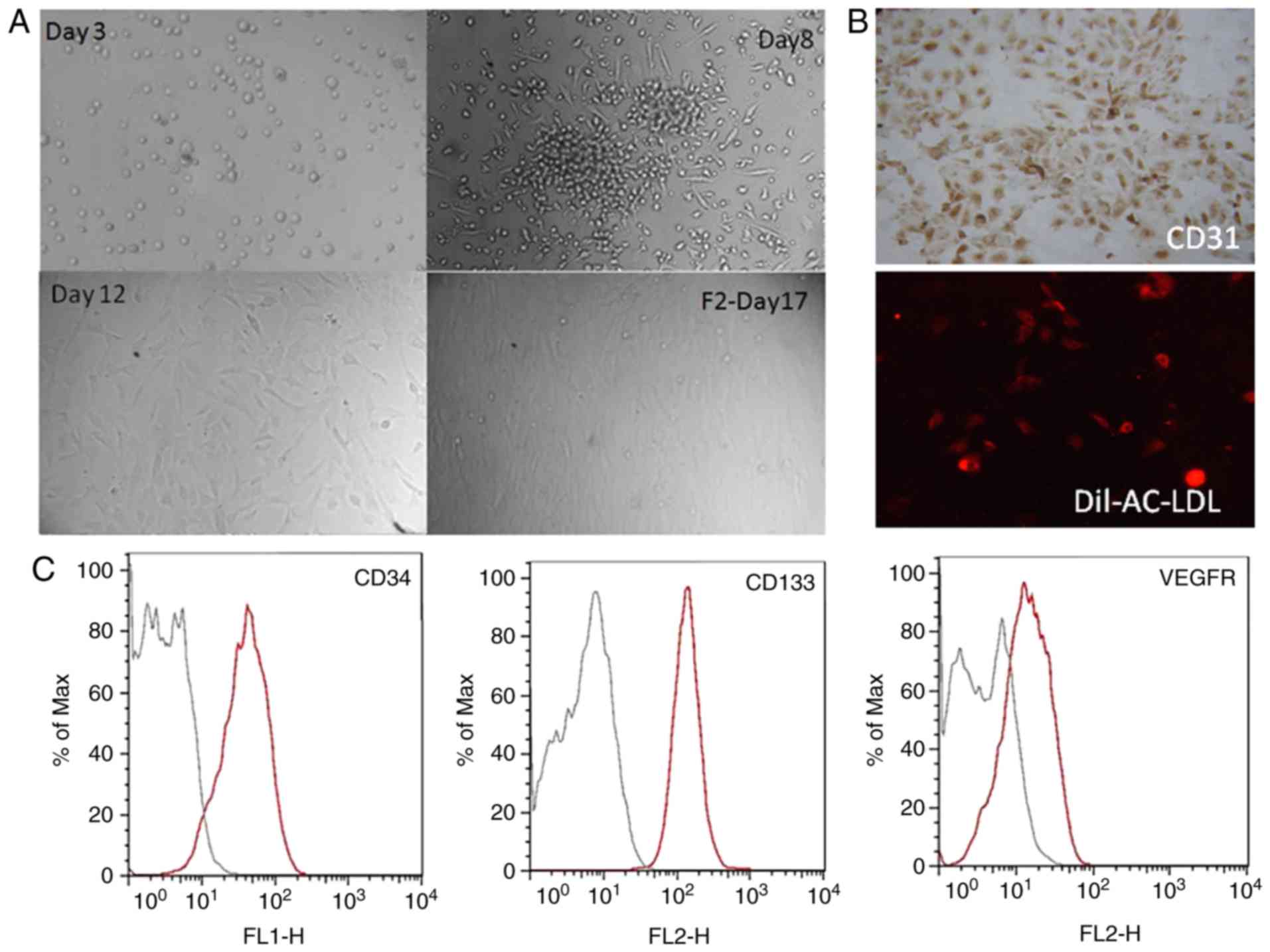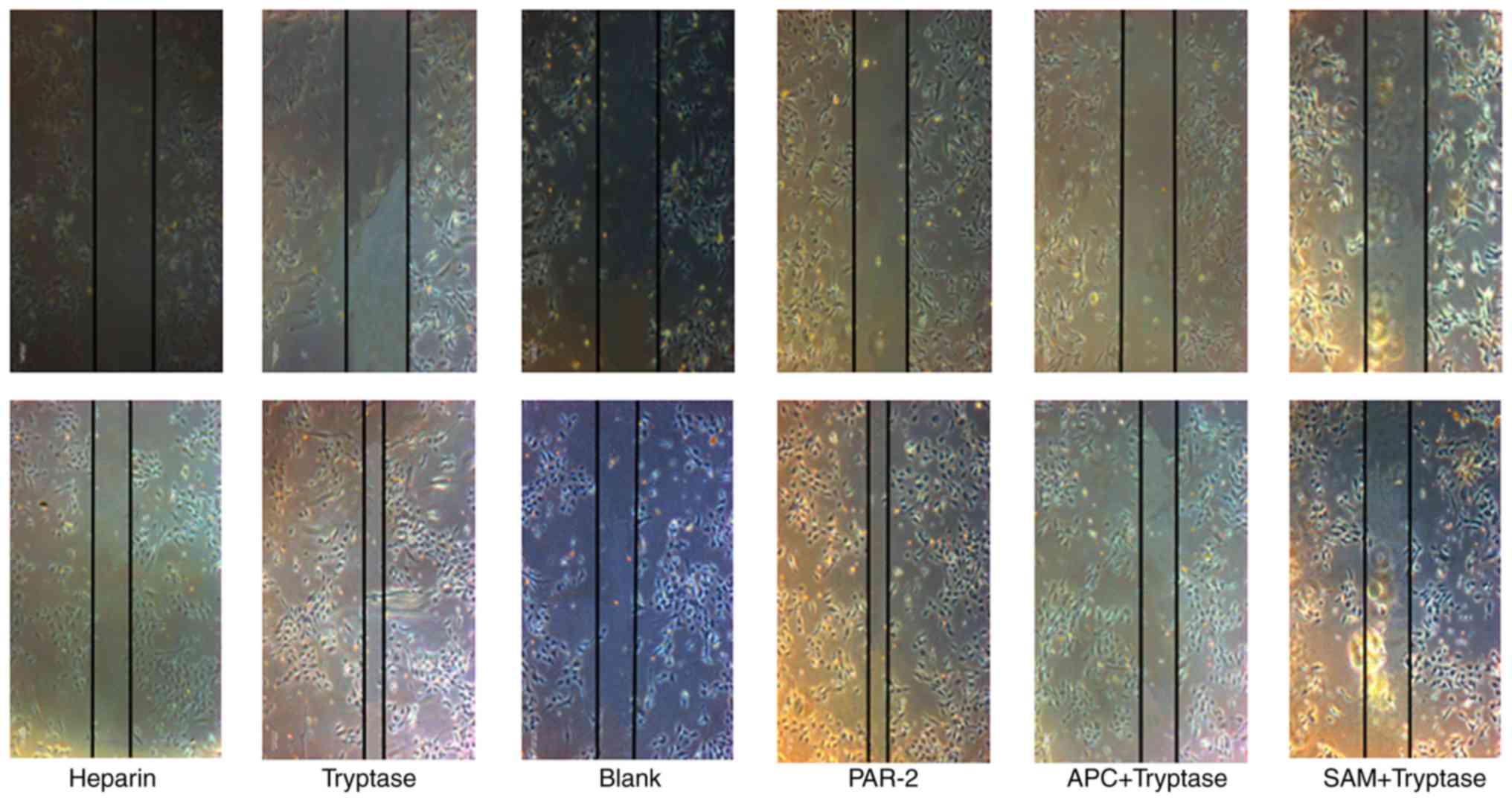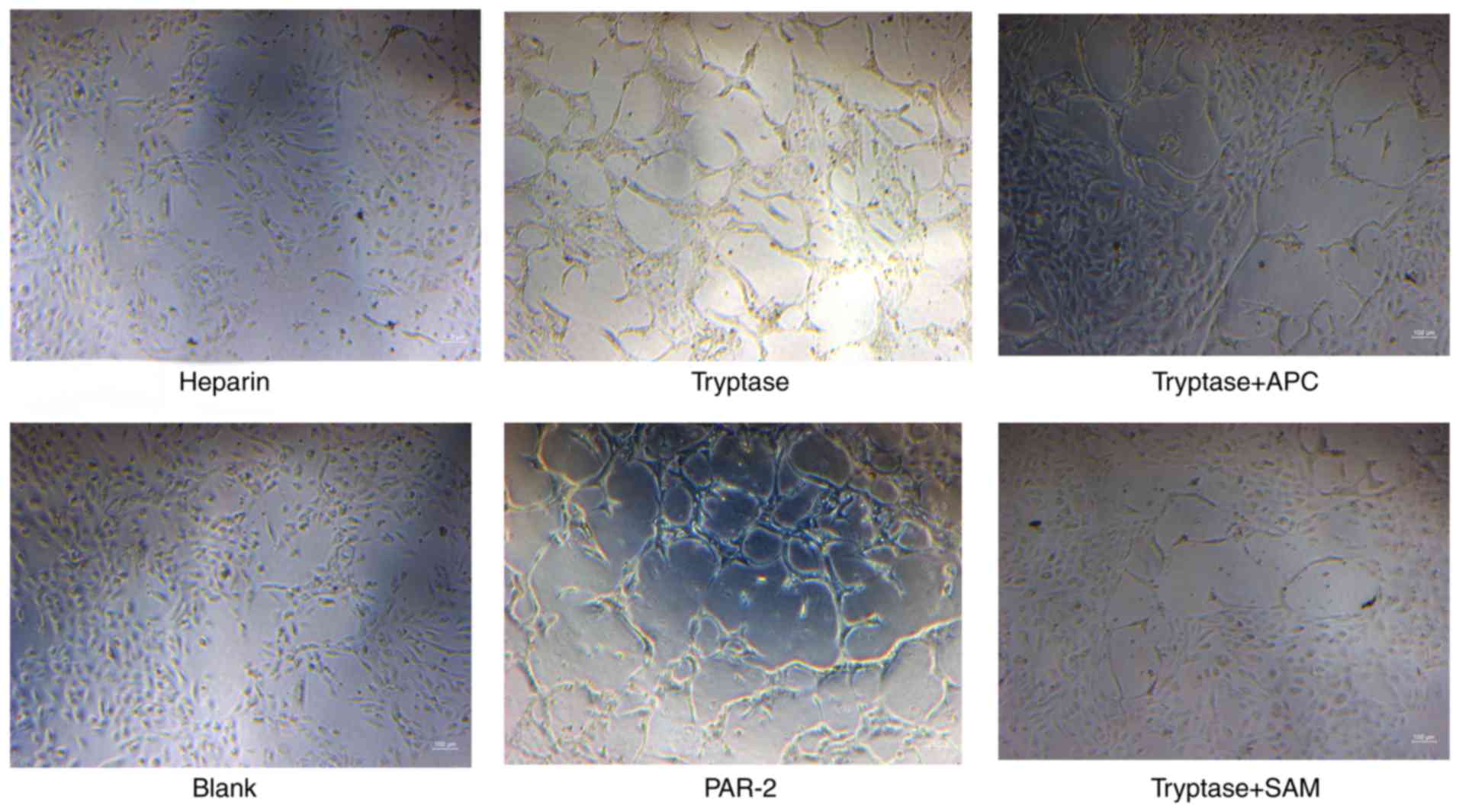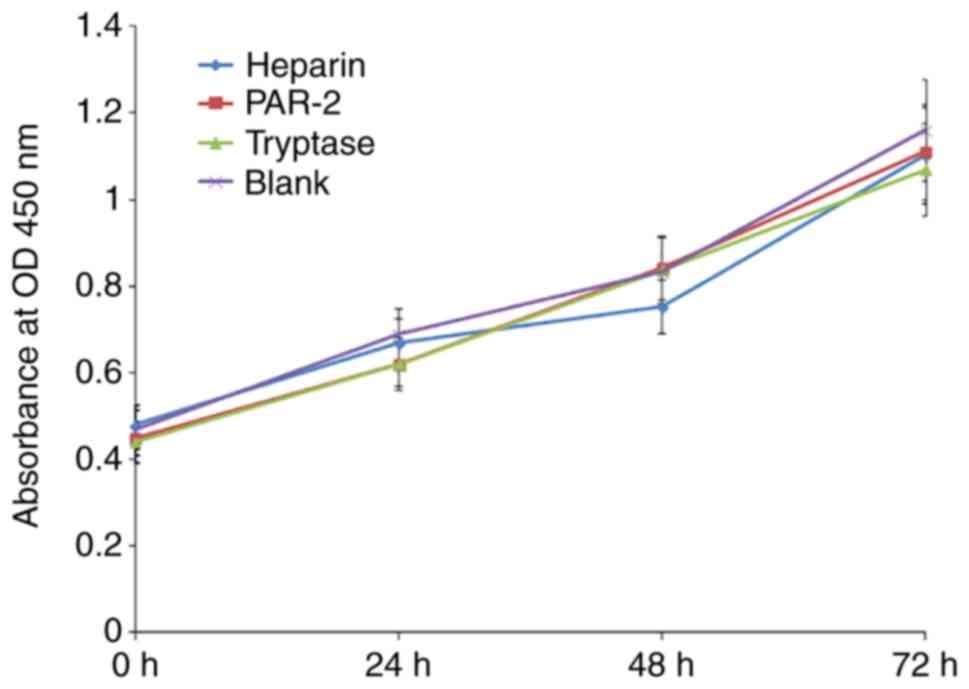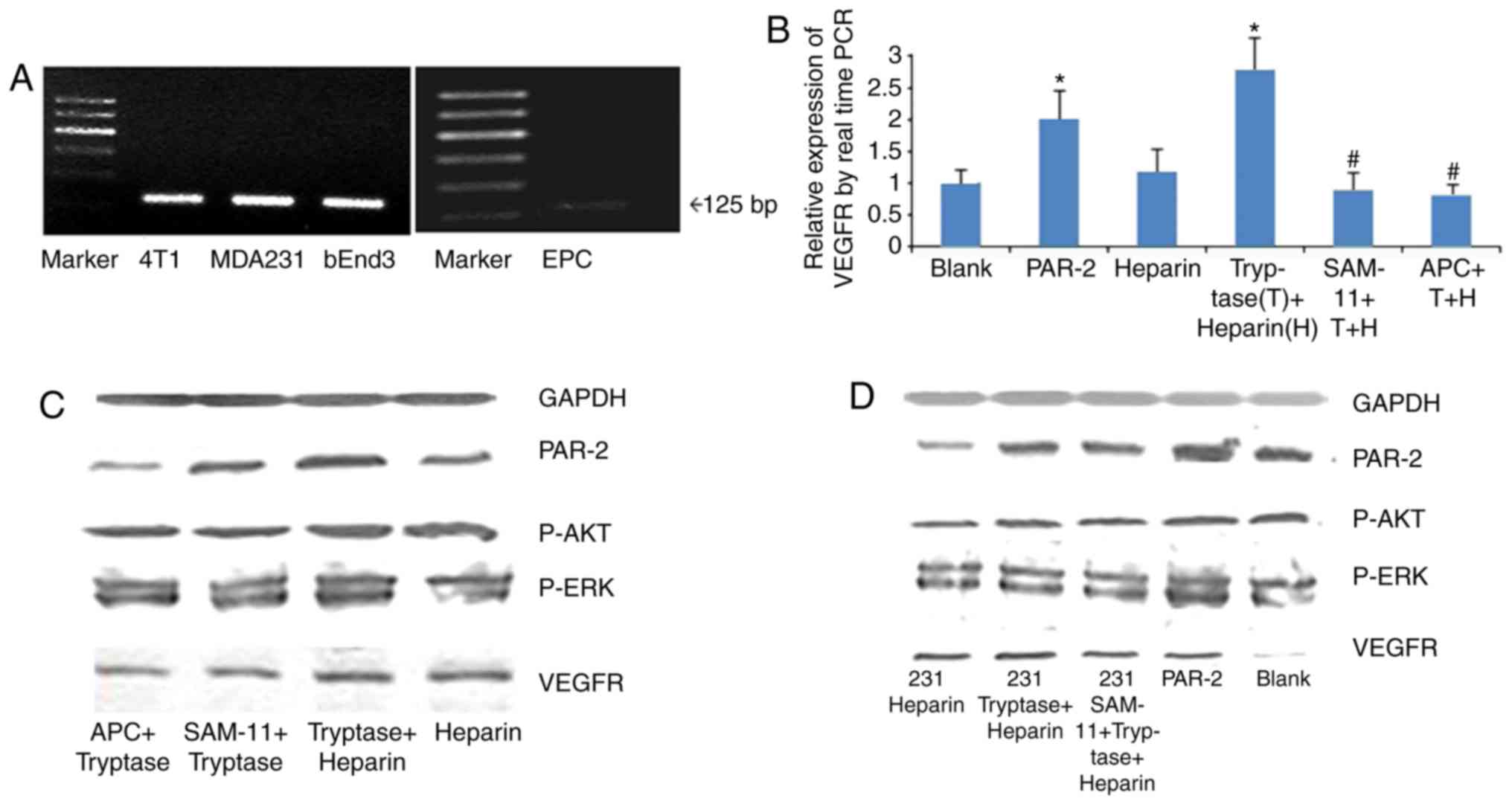|
1
|
Folkman J: Antiangiogenesis in cancer
therapy-endostatin and its mechanisms of action. Exp Cell Res.
312:594–607. 2006. View Article : Google Scholar : PubMed/NCBI
|
|
2
|
Roberts N, Jahangiri M and Xu Q:
Progenitor cells in vascular disease. J Cell Mol Med. 9:583–591.
2005. View Article : Google Scholar : PubMed/NCBI
|
|
3
|
Ribatti D, Ennas MG, Vacca A, Ferreli F,
Nico B, Orru S and Sirigu P: Tumor vascularity and
tryptase-positive mast cells correlate with a poor prognosis in
melanoma. Eur J Clin Invest. 33:420–425. 2003. View Article : Google Scholar : PubMed/NCBI
|
|
4
|
Ribatti D, Finato N, Crivellato E,
Guidolin D, Longo V, Mangieri D, Nico B, Vacca A and Beltrami CA:
Angiogenesis and mast cells in human breast cancer sentinel lymph
nodes with and without micrometastases. Histopathology. 51:837–842.
2007. View Article : Google Scholar : PubMed/NCBI
|
|
5
|
Mauro LV, Bellido M, Morandi A, Bonadeo F,
Vaccaro C, Quintana GO, Pallotta MG, Lastiri J, Puricelli LI and de
Cidre LL: Association between mast cells of different phenotypes
and angiogenesis in colorectal cancer. Mol Med Rep. 1:895–902.
2008.PubMed/NCBI
|
|
6
|
Micu GV, Stăniceanu F, Sticlaru LC, Popp
CG, Bastian AE, Gramada E, Pop G, Mateescu RB, Rimba M, Archip B
and Bleotu C: correlations between the density of tryptase positive
mast cells (DMCT) and that of new blood vessels (CD105+) in
patients with gastric cancer. Rom J Intern Med. 54:113–120.
2016.PubMed/NCBI
|
|
7
|
Norrby K: Mast cells and angiogenesis.
APMIS. 110:355–371. 2002. View Article : Google Scholar : PubMed/NCBI
|
|
8
|
He S and Walls AF: Human mast cell
tryptase: A stimulus of microvascular leakage and mast cell
activation. Eur J Pharmacol. 328:89–97. 1997. View Article : Google Scholar : PubMed/NCBI
|
|
9
|
He S, Peng Q and Walls AF: Potent
induction of a neutrophil and eosinophil-rich infiltrate in vivo by
human mast cell tryptase: Selective enhancement of eosinophil
recruitment by histamine. J Immunol. 159:6216–6225. 1997.PubMed/NCBI
|
|
10
|
Cairns JA and Walls AF: Mast cell tryptase
is a mitogen for epithelial cells. Stimulation of IL-8 production
and intercellular adhesion molecule-1 expression. J Immunol.
156:275–283. 1996.PubMed/NCBI
|
|
11
|
Xiang M, Gu Y, Zhao F, Lu H, Chen S and
Yin L: Mast cell tryptase promotes breast cancer migration and
invasion. Oncol Rep. 23:615–619. 2010.PubMed/NCBI
|
|
12
|
Ossovskaya VS and Bunnett NW:
Protease-activated receptors: Contribution to physiology and
disease. Physiol Rev. 84:579–621. 2004. View Article : Google Scholar : PubMed/NCBI
|
|
13
|
Yau MK, Liu L and Fairlie DP: Toward drugs
for protease-activated receptor 2 (PAR2). J Med Chem. 56:7477–7497.
2013. View Article : Google Scholar : PubMed/NCBI
|
|
14
|
Jahan I, Fujimoto J, Alam SM, Sato E,
Sakaguchi H and Tamaya T: Role of protease activated receptor-2 in
tumor advancement of ovarian cancers. Ann Oncol. 18:1506–1512.
2007. View Article : Google Scholar : PubMed/NCBI
|
|
15
|
Darmoul D, Gratio V, Devaud H and Laburthe
M: Protease-activated receptor 2 in colon cancer: trypsin-induced
MAPK phosphorylation and cell proliferation are mediated by
epidermal growth factor receptor transactivation. J Biol Chem.
279:20927–20934. 2004. View Article : Google Scholar : PubMed/NCBI
|
|
16
|
Liu Y and Mueller BM: Protease-activated
receptor-2 regulates vascular endothelial growth factor expression
in MDA-MB-231 cells via MAPK pathways. Biochem Biophys Res Commun.
344:1263–1270. 2006. View Article : Google Scholar : PubMed/NCBI
|
|
17
|
Smadja DM, Bièche I, Uzan G, Bompais H,
Muller L, Boisson-Vidal C, Vidaud M, Aiach M and Gaussem P: PAR-1
activation on human late endothelial progenitor cells enhances
angiogenesis in vitro with upregulation of the SDF-1/CXCR4 system.
Arterioscler Thromb Vasc Biol. 25:2321–2327. 2005. View Article : Google Scholar : PubMed/NCBI
|
|
18
|
Ranieri G, Ammendola M, Patruno R, Celano
G, Zito FA, Montemurro S, Rella A, Di Lecce V, Gadaleta CD,
Battista De Sarro G and Ribatti D: Tryptase-positive mast cells
correlate with angiogenesis in early breast cancer patients. Int J
Oncol. 35:115–120. 2009. View Article : Google Scholar : PubMed/NCBI
|
|
19
|
Eggermann J, Kliche S, Jarmy G, Hoffmann
K, Mayr-Beyrle U, Debatin KM, Waltenberger J and Beltinger C:
Endothelial progenitor cell culture and differentiation in vitro: A
methodological comparison using human umbilical cord blood.
Cardiovasc Res. 58:478–486. 2003. View Article : Google Scholar : PubMed/NCBI
|
|
20
|
Liang CC, Park AY and Guan JL: In vitro
scratch assay: A convenient and inexpensive method for analysis of
cell migration in vitro. Nat Protoc. 2:329–333. 2007. View Article : Google Scholar : PubMed/NCBI
|
|
21
|
Arnaoutova I, George J, Kleinman HK and
Benton G: The endothelial cell tube formation assay on basement
membrane turns 20: State of the science and the art. Angiogenesis.
12:267–274. 2009. View Article : Google Scholar : PubMed/NCBI
|
|
22
|
Livak KJ and Schmittgen TD: Analysis of
relative gene expression data using real-time quantitative PCR and
the 2(-Delta Delta C(T)) method. Methods. 25:402–408. 2001.
View Article : Google Scholar : PubMed/NCBI
|
|
23
|
Vajkoczy P, Blum S, Lamparter M,
Mailhammer R, Erber R, Engelhardt B, Vestweber D and Hatzopoulos
AK: Multistep nature of microvascular recruitment of ex
vivo-expanded embryonic endothelial progenitor cells during tumor
angiogenesis. J Exp Med. 197:1755–1765. 2003. View Article : Google Scholar : PubMed/NCBI
|
|
24
|
Mancuso P, Burlini A, Pruneri G,
Goldhirsch A, Martinelli G and Bertolini F: Resting and activated
endothelial cells are increased in the peripheral blood of cancer
patients. Blood. 97:3658–3661. 2001. View Article : Google Scholar : PubMed/NCBI
|
|
25
|
Gao D, Nolan DJ, Mellick AS, Bambino K,
McDonnell K and Mittal V: Endothelial progenitor cells control the
angiogenic switch in mouse lung metastasis. Science. 319:195–198.
2008. View Article : Google Scholar : PubMed/NCBI
|
|
26
|
Li B, Sharpe EE, Maupin AB, Teleron AA,
Pyle AL, Carmeliet P and Young PP: VEGF and PlGF promote adult
vasculogenesis by enhancing EPC recruitment and vessel formation at
the site of tumor neovascularization. FASEB J. 20:1495–1497. 2006.
View Article : Google Scholar : PubMed/NCBI
|
|
27
|
Starkey JR, Crowle PK and Taubenberger S:
Mast-cell-deficient W/Wv mice exhibit a decreased rate of tumor
angiogenesis. Int J Cancer. 42:48–52. 1988. View Article : Google Scholar : PubMed/NCBI
|
|
28
|
Caughey GH: Mast cell tryptases and
chymases in inflammation and host defense. Immunol Rev.
217:141–154. 2007. View Article : Google Scholar : PubMed/NCBI
|
|
29
|
Marech I, Ammendola M, Sacco R, Capriuolo
GS, Patruno R, Rubini R, Luposella M, Zuccalà V, Savino E, Gadaleta
CD, et al: Serum tryptase, mast cells positive to tryptase and
microvascular density evaluation in early breast cancer patients:
Possible translational significance. BMC Cancer. 14:5342014.
View Article : Google Scholar : PubMed/NCBI
|
|
30
|
Blair RJ, Meng H, Marchese MJ, Ren S,
Schwartz LB, Tonnesen MG and Gruber BL: Human mast cells stimulate
vascular tube formation. Tryptase is a novel, potent angiogenic
factor. J Clin Invest. 99:2691–2700. 1997.
|
|
31
|
Hiromatsu Y and Toda S: Mast cells and
angiogenesis. Microsc Res Tech. 60:64–69. 2003. View Article : Google Scholar : PubMed/NCBI
|
|
32
|
Kawabata A: Gastrointestinal functions of
proteinase-activated receptors. Life Sci. 74:247–254. 2003.
View Article : Google Scholar : PubMed/NCBI
|
|
33
|
Ammendola M, Leporini C, Marech I,
Gadaleta CD, Scognamillo G, Sacco R, Sammarco G, de Sarro G, Russo
E and Ranieri G: Targeting mast cells tryptase in tumor
microenvironment: A potential antiangiogenetic strategy. Biomed Res
Int. 2014:1547022014. View Article : Google Scholar : PubMed/NCBI
|
|
34
|
Ge L, Shenoy SK, Lefkowitz RJ and DeFea K:
Constitutive protease-activated receptor-2-mediated migration of
MDA MB-231 breast cancer cells requires both beta-arrestin-1 and
−2. J Biol Chem. 279:55419–55424. 2004. View Article : Google Scholar : PubMed/NCBI
|
|
35
|
Wilson SR, Gallagher S, Warpeha K and
Hawthorne SJ: Amplification of MMP-2 and MMP-9 production by
prostate cancer cell lines via activation of protease-activated
receptors. Prostate. 60:168–174. 2004. View Article : Google Scholar : PubMed/NCBI
|
|
36
|
Ma Y, Zhang B, Qian R, Lu C, Zhao F and
Yin L: Tryptase activates PKB in inflammatory reaction in ECV304
cells. Biochim Biophys Acta. 1763:313–321. 2006. View Article : Google Scholar : PubMed/NCBI
|
|
37
|
Nonaka M, Pawankar R, Fukumoto A, Ogihara
N, Sakanushi A and Yagi T: Induction of eotaxin production by
interleukin-4, interleukin-13 and lipopolysaccharide by nasal
fibroblasts. Clin Exp Allergy. 34:804–811. 2004. View Article : Google Scholar : PubMed/NCBI
|
|
38
|
Kohri K, Ueki IF and Nadel JA: Neutrophil
elastase induces mucin production by ligand-dependent epidermal
growth factor receptor activation. Am J Physiol Lung Cell Mol
Physiol. 283:L531–L540. 2002. View Article : Google Scholar : PubMed/NCBI
|
|
39
|
Compton SJ, McGuire JJ, Saifeddine M and
Hollenberg MD: Restricted ability of human mast cell tryptase to
activate proteinase-activated receptor-2 in rat aorta. Can J
Physiol Pharmacol. 80:987–992. 2002. View
Article : Google Scholar : PubMed/NCBI
|
|
40
|
Koo BH, Chung KH, Hwang KC and Kim DS:
Factor Xa induces mitogenesis of coronary artery smooth muscle cell
via activation of PAR-2. FEBS Lett. 523:85–89. 2002. View Article : Google Scholar : PubMed/NCBI
|
|
41
|
Yoshii M, Jikuhara A, Mori S, Iwagaki H,
Takahashi HK, Nishibori M and Tanaka N: Mast cell tryptase
stimulates DLD-1 carcinoma through prostaglandin- and MAP
kinase-dependent manners. J Pharmacol Sci. 98:450–458. 2005.
View Article : Google Scholar : PubMed/NCBI
|
|
42
|
Weidinger S, Mayerhofer A, Kunz L,
Albrecht M, Sbornik M, Wunn E, Hollweck R, Ring J and Kohn FM:
Tryptase inhibits motility of human spermatozoa mainly by
activation of the mitogen-activated protein kinase pathway. Hum
Reprod. 20:456–461. 2005. View Article : Google Scholar : PubMed/NCBI
|
|
43
|
Khan MW, Keshavarzian A, Gounaris E,
Melson JE, Cheon EC, Blatner NR, Chen ZE, Tsai FN, Lee G, Ryu H, et
al: PI3K/AKT signaling is essential for communication between
tissue-infiltrating mast cells, macrophages, and epithelial cells
in colitis-induced cancer. Clin Cancer Res. 19:2342–2354. 2013.
View Article : Google Scholar : PubMed/NCBI
|
|
44
|
Wang JY, Lee YT, Chang PF and Chau LY:
Hemin promotes proliferation and differentiation of endothelial
progenitor cells via activation of AKT and ERK. J Cell Physiol.
219:617–625. 2009. View Article : Google Scholar : PubMed/NCBI
|















